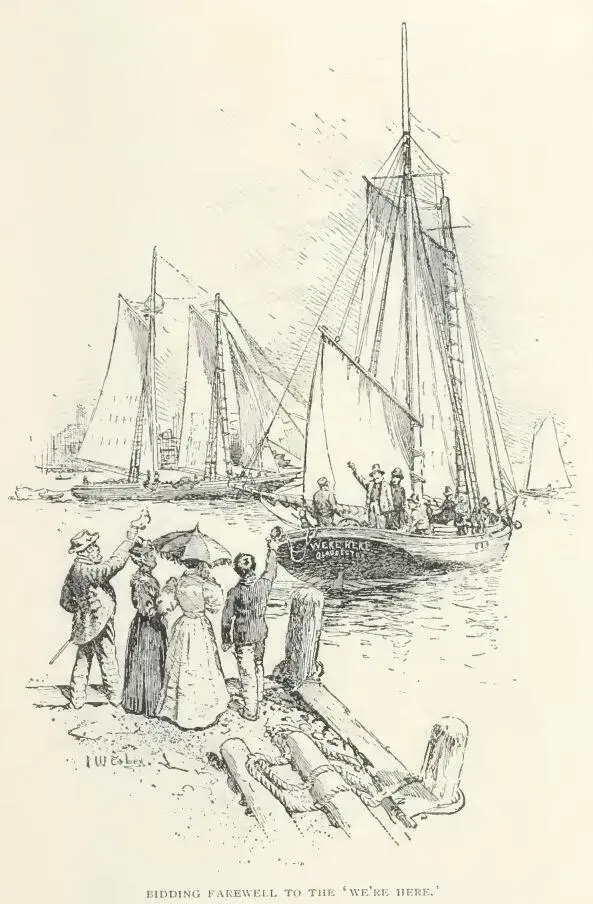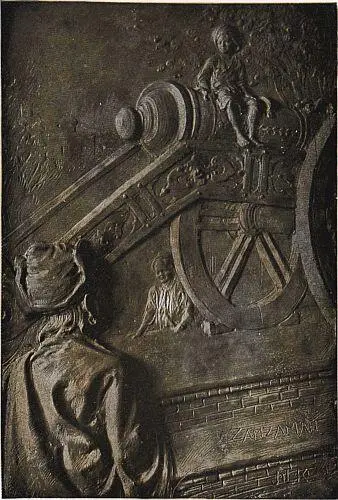And so the old crowd—Harvey felt like the most ancient of mariners—dropped into the old schooner among the battered dories, while Harvey slipped the stern-fast from the pier-head, and they slid her along the wharf-side with their hands. Every one wanted to say so much that no one said anything in particular. Harvey bade Dan take care of Uncle Salters's sea-boots and Penn's dory-anchor, and Long Jack entreated Harvey to remember his lessons in seamanship; but the jokes fell flat in the presence of the two women, and it is hard to be funny with green harbour-water widening between good friends.
"Up jib and fores'l!" shouted Disko, getting to the wheel, as the wind took her. "See you later, Harve. Dunno but I come near thinkin' a heap o' you an' your folks."
Then she glided beyond ear-shot, and they sat down to watch her up the harbour. And still Mrs. Cheyne wept.
"Psha', my dear," said Mrs. Troop; "we're both women, I guess. Like's not it'll ease your heart to hev your cry aout. God He knows it never done me a mite o' good; but then He knows I've had something to cry fer!"
Now it was a few years later, and upon the other edge of America, that a young man came through the clammy sea-fog up a windy street which is flanked with most expensive houses built of wood to imitate stone. To him, as he was standing by a hammered iron gate, entered on horseback—and the horse would have been cheap at a thousand dollars—another young man. And this is what they said:
"Hello, Dan!"
"Hello, Harve!"
"What's the best with you?"
"Well, I'm so's to be that kind o' animal called second mate this trip. Ain't you most through with that triple-invoiced college o' yours?"
"Getting that way. I tell you, the Leland Stanford Junior isn't a circumstance to the old "We're Here"; but I'm coming into the business for keeps next fall."
"Meanin' aour packets?"
"Nothing else. You just wait till I get my knife into you, Dan. I'm going to make the old line lie down and cry when I take hold."
"I'll resk it," said Dan, with a brotherly grin, as Harvey dismounted and asked whether he were coming in.
"That's what I took the cable fer; but, say, is the doctor anywheres araound? I'll draown that crazy nigger some day, his one cussed joke an' all."
There was a low, triumphant chuckle, as the ex-cook of the "We're Here" came out of the fog to take the horse's bridle. He allowed no one but himself to attend to any of Harvey's wants.
"Thick as the Banks, ain't it, doctor?" said Dan, propitiatingly.
But the coal-black Celt with the second-sight did not see fit to reply till he had tapped Dan on the shoulder, and for the twentieth time croaked the old, old prophecy in his ear:
"Master—man. Man—master," said he. "You remember, Dan Troop, what I said? On the 'We're Here'?"
"Well, I won't go so far as to deny that it do look like it as things stand at present," said Dan. "She was an able packet, and one way an' another I owe her a heap—her and dad."
"Me too," quoth Harvey Cheyne.

Table of Contents
Chapter I
Chapter II
Chapter III
Chapter IV
Chapter V
Chapter VI
Chapter VII
Chapter VIII
Chapter IX
Chapter X
Chapter XI
Chapter XII
Chapter XIII
Chapter XIV
Chapter XV
 Kim.
Kim.
Table of Contents
'Oh ye who tread the Narrow Way
By Tophet-flare to Judgment Day,
Be gentle when the heathen pray
To Buddha at Kamakura!'
He sat, in defiance of municipal orders, astride the gun Zam-Zammah on her brick platform opposite the old Ajaib-Gher—the Wonder House, as the natives call the Lahore Museum. Who hold Zam-Zammah, that 'fire-breathing dragon,' hold the Punjab, for the great green-bronze piece is always first of the conqueror's loot.
There was some justification for Kim,—he had kicked Lala Dinanath's boy off the trunnions,—since the English held the Punjab and Kim was English. Though he was burned black as any native; though he spoke the vernacular by preference, and his mother-tongue in a clipped uncertain sing-song; though he consorted on terms of perfect equality with the small boys of the bazar; Kim was white—a poor white of the very poorest. The half-caste woman who looked after him (she smoked opium, and pretended to keep a second-hand furniture shop by the square where the cheap cabs wait) told the missionaries that she was Kim's mother's sister; but his mother had been nursemaid in a colonel's family and had married Kimball O'Hara, a young colour-sergeant of the Mavericks, an Irish regiment. He afterwards took a post on the Sind, Punjab, and Delhi railway, and his regiment went home without him. The wife died of cholera in Ferozepore, and O'Hara fell to drink and loafing up and down the line with the keen-eyed three-year-old baby. Societies and chaplains, anxious for the child, tried to catch him, but O'Hara drifted away, till he came across the woman who took opium and learned the taste from her, and died as poor whites die in India. His estate at death consisted of three papers—one he called his 'ne varietur' because those words were written below his signature thereon, and another his 'clearance-certificate.' The third was Kim's birth-certificate. Those things, he was used to say, in his glorious opium-hours, would yet make little Kimball a man. On no account was Kim to part with them, for they belonged to a great piece of magic—such magic as men practised over yonder behind the Museum, in the big blue and white Jadoo-Gher—the Magic House, as we name the Masonic Lodge. It would, he said, all come right some day, and Kim's horn would be exalted between pillars—monstrous pillars—of beauty and strength. The Colonel himself, riding on a horse, at the head of the finest regiment in the world, would attend to Kim,—little Kim that should have been better off than his father. Nine hundred first-class devils, whose god was a Red Bull on a green field, would attend to Kim, if they had not forgotten O'Hara—poor O'Hara that was gang-foreman on the Ferozepore line. Then he would weep bitterly in the broken rush chair on the veranda. So it came about after his death that the woman sewed parchment, paper, and birth-certificate into a leather amulet-case which she strung round Kim's neck.
'And some day,' she said, confusedly remembering O'Hara's prophecies, 'there will come for you a great Red Bull on a green field, and the Colonel riding on his tall horse, yes, and'—dropping into English—'nine hundred devils.'
'Ah,' said Kim, 'I shall remember. A Red Bull and a Colonel on a horse will come, but first, my father said, will come the two men making ready the ground for these matters. That is how, my father said, they always did; and it is always so when men work magic.'
If the woman had sent Kim up to the local Jadoo-Gher with those papers, he would, of course, have been taken over by the Provincial Lodge and sent to the Masonic Orphanage in the Hills; but what she had heard of magic she distrusted. Kim, too, held views of his own. As he reached the years of indiscretion, he learned to avoid missionaries and white men of serious aspect who asked who he was, and what he did. For Kim did nothing with an immense success. True, he knew the wonderful walled city of Lahore from the Delhi Gate to the outer Fort Ditch; was hand in glove with men who led lives stranger than anything Haroun al Raschid dreamed of; and he lived in a life wild as that of the Arabian Nights, but missionaries and secretaries of charitable societies could not see the beauty of it. His nickname through the wards was 'Little Friend of all the World'; and very often, being lithe and inconspicuous, he executed commissions by night on the crowded housetops for sleek and shiny young men of fashion. It was intrigue, of course,—he knew that much, as he had known all evil since he could speak,—but what he loved was the game for its own sake—the stealthy prowl through the dark gullies and lanes, the crawl up a water-pipe, the sights and sounds of the women's world on the flat roofs, and the headlong flight from housetop to housetop under cover of the hot dark. Then there were holy men, ash-smeared faquirs by their brick shrines under the trees at the riverside, with whom he was quite familiar—greeting them as they returned from begging-tours, and, when no one was by, eating from the same dish. The woman who looked after him insisted with tears that he should wear European clothes—trousers, a shirt, and a battered hat. Kim found it easier to slip into Hindu or Mohammedan garb when engaged on certain businesses. One of the young men of fashion—he who was found dead at the bottom of a well on the night of the earthquake—had once given him a complete suit of Hindu kit, the costume of a low-caste street boy, and Kim stored it in a secret place under some baulks in Nila Ram's timber-yard, beyond the Punjab High Court, where the fragrant deodar logs lie seasoning after they have driven down the Ravee. When there was business or frolic afoot, Kim would use his properties, returning at dawn to the veranda, all tired out from shouting at the heels of a marriage procession, or yelling at a Hindu festival. Sometimes there was food in the house, more often there was not, and then Kim went out again to eat with his native friends.
Читать дальше


 Kim.
Kim.










